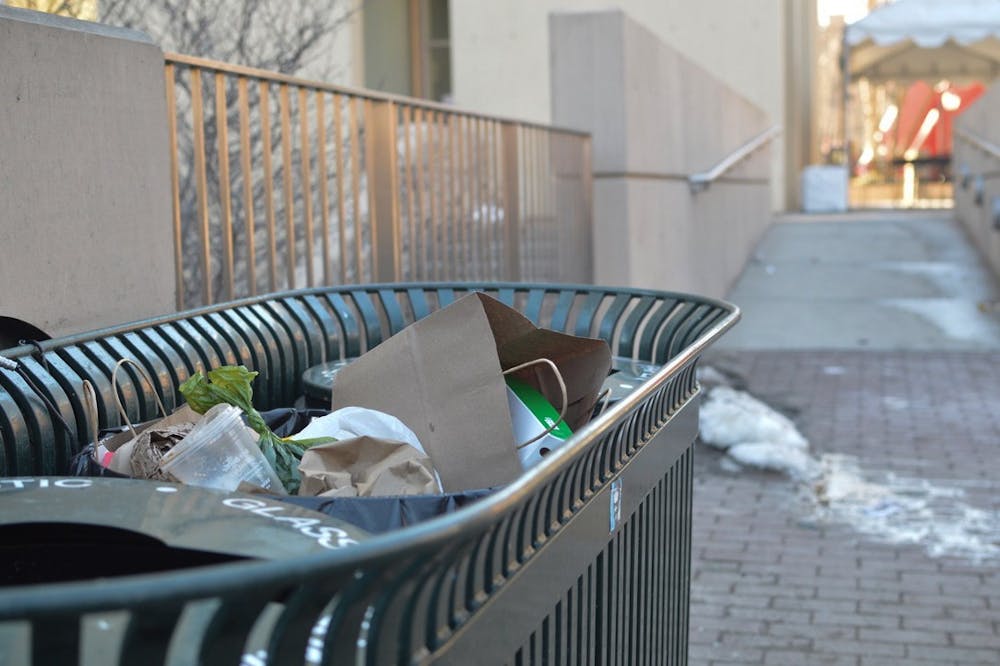It’s expected that some parts of the college experience are going to be different when you arrive on campus in the middle of a pandemic. Instead of running across campus to lectures, I’ve been racing to COVID-19 testing sites with my PennCard in one hand and a loading OpenPass in the other. Instead of being social at parties and club meetings, I have a schedule jam-packed with Zooms. And instead of eating communally in buffet-style dining halls, I shuffle into Hill, grab a pre-packaged meal, and dine in my dorm during an online lecture.
Changes in lifestyle are expected in a pandemic, but these changes are often coming with environmental costs that Penn is neglecting to address. Penn has implemented various initiatives in Penn Sustainability and Penn Dining, but neither organization could provide any data demonstrating that these initiatives had substantial impact.
When I got to campus last month, one of my first tasks was getting accustomed to Philadelphia's single-stream recycling system. I expected it to be a breeze compared to back home, where my family sorts recycling into three bins, plus compost.
Unfortunately, I soon discovered that at Penn many of the dining containers that we used either could not be recycled, or it was unclear if they could be. In a week’s worth of dining hall trips, I could rinse and recycle a few plastic fruit cups and clamshell containers, but not much else. The paper containers that we eat pizza or fries in cannot be recycled if stained with food, so the bottom halves get tossed in the trash. In Philadelphia, plastic bags, utensils, and takeout containers also cannot be recycled, as they can damage recycling equipment.
I was temporarily relieved when I realized that the black plastic takeout containers that I had been recycling for weeks were composed of type five plastics, which Philadelphia recycles. Then, I learned that black plastic often ends up in landfills anyway, and that more than half of Philadelphia’s recycling goes to an incinerator.
Were my frantic Google searches on what was and wasn’t recyclable pointless? Did I spend hours washing my plastic containers and sorting my trash for nothing? As I contemplated these questions, two thoughts came to mind:
First, that it is always better to reduce and reuse than to recycle. If we could reuse the containers we eat out of, like we did before the pandemic, the question of whether or not Philadelphia even recycles becomes less relevant to Penn’s sustainability commitment. Penn Dining has tried to encourage reuse by providing students with reusable cloth bags, and has restarted the Green2Go program, where students can request a reusable container at select locations and bring it back to be washed.
Second, and perhaps more importantly: how many Penn students are going to actively seek out resources to recycle when it is considerably easier to just chuck everything into a trash bin? Whether I’m on Locust Walk or walking the halls of my college house, one glance at overflowing trash cans shows just how ineffective Penn’s initiatives have been. I haven’t seen any Green2Go containers in the dining halls, and though we can request to not have disposable utensils in our online food orders, I’ve yet to see any of those requests honored.
SEE MORE FROM CAROLINE MAGDOLEN:
I reached out to Penn Sustainability and received an overview of the initiatives that they and Penn Dining have implemented. They offered the following takeaway message: “skip the disposable silverware, bring your blue reusable bag to the dining hall, and utilize Green2Go reusable clamshells.”
Penn Sustainability emphasized that they have thousands of followers on their social media accounts, and encouraged readers of the Daily Pennsylvanian to follow their pages on Instagram and Facebook, as well as @greenpenn on Twitter. Social media posts are better than nothing, but it’s clear that few engage with them. Over 2,000 people follow their Instagram account, yet only a few dozen of them like their posts. If so few students commit to the “slacktivism” of liking a post, then how many students are actually recycling?
In the sustainability crisis, Penn as a whole can no longer rely on passive actions, like posting to social media or sending the occasional email, to get the job done. Especially as it remains unclear whether Philadelphia actually recycles, Penn’s best course of action may be ditching plastics and paper bags altogether. The devastating effects of our wasteful habits may be less visible than a global pandemic, but we must nonetheless avoid them at all costs.
CAROLINE MAGDOLEN is a College and Engineering first year studying systems engineering and environmental science from New York City, N.Y. Her email address is magdolen@sas.upenn.edu.









